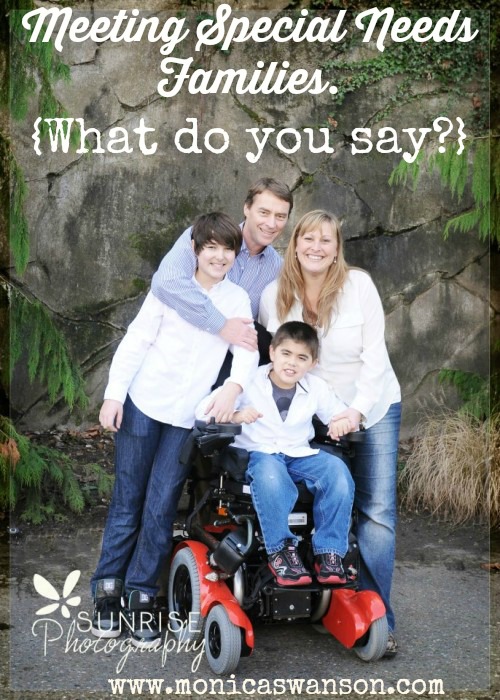Meeting a Special Needs Family: What do you say?
Since my extended family visit a few weeks ago, I’ve been pondering the topic of this post. Since my nephew Micah has Muscular Dystrophy, our entire family is very used to doing things a little differently. Talking to my sister-in-law about having a special needs child, I confessed some of my own challenges when I meet a family with a special needs child for the first time…
How many times I’ve been there: At the park, or some social event, and I meet someone new. She might have a kid, or two or four with her, and one of them clearly has special needs. Maybe the child has an obvious disability, but maybe I just pick up on slight differences…a limp or something in the way he or she speaks or moves–something that says different, but not so different to give away what might be going on.
And I chat with the mom and I look at the child, and I fidget around and the whole time the elephant in the room is I’m really interested in knowing about your child, but I’m way too awkward to ask.
Has anyone been there before?
It shouldn’t be that big of a deal, right? Special needs kids are kids, like yours and mine. And if anyone knew our kids like we know them, they’d see that literally ALL kids have “special needs” of one sort or another. (as do the parents, :).) Obviously there is a big range of type and severity of disabilities that might be called “special needs,” but I imagine all families would appreciate others being less awkward and more inclusive. I think it would be healthy for us to all get a bit more comfortable with this subject.
I kick myself for any time I’ve avoided a situation because I was too awkward to know what to say. We could learn so much from the awesome kids and amazing parents of kids with special needs. I personally want to know as many of them as possible.
I am blessed to have a number of families with special needs children in my close circle of friends and family. So I’ve spent some time chatting with the parents to ask how they prefer an awkward dork like me to approach them when we first meet.
My questions:
Should I pretend not to notice?
Or if I ask, how do I ask? What do I say?
Does this really need to be so hard?
What families said: I went first to my sister-in-law Janelle, whose son Micah was adopted from here in Hawaii. They had no idea at the time that their precious new baby had the devastating genetic disease called Duchenne Muscular Dystrophy. He was diagnosed around age three, and it changed every single thing about their life. (Read more about him in my post from last year, here.) Micah is now in a wheelchair full time, so it is impossible to ignore his handicap. But still, plenty of people stare or whisper, trying to guess what might be wrong.
So I asked Janelle, “How would you prefer people approach you, when they are curious about Micah and his disability?”
And her answer was really quite simple: “Just ask. Ask anything. But please don’t stare at him and not say anything.”
I talked to another friend whose son has brain damage and physical disabilities from a traumatic birth. And another friend whose daughter has a little-known genetic disorder called Rett Syndrome. And another friend whose son has Down Syndrome. I know this is a small sample of our population, but I think that their responses were helpful, and really reasonable.
All of these Mothers agreed that if you have questions, you should ask. One of the moms said that she appreciates it if you ask because she too, is often awkward. “I’ll be a park and meet other moms and it is so obvious that they are curious about my child. But what should I say, ‘Just so you know, my kid looks/acts like this because of this disease.'” She said it really makes her feel more comfortable if people just come right out and ask. It takes the pressure off of her.
My sister-in-law Janelle said, “I don’t think you could offend me if you’re asking with a genuine interest in my child. You really can’t say the wrong thing.”
I believed her, but I know me. I could easily say something with genuine interest and still find a way to put my foot in my mouth. I want to be cautious and respectful. And then there’s the fear of “What if I ask and really the child just looks different and actually doesn’t have a disability. What if…what if…what if…”
My recent attempt: Recently, when I met a family for the first time whose child had a fairly apparent disability, I tried a new phrase that I had been thinking about for a while. I met the mother, smiled a the boy, and chatted for a brief moment. Then, I touched the boy’s shoulder and said “I’d love to hear Dylan’s story.”
This opened the door for the mother to tell me as much or as little as she wanted. I was able to hear about her son’s diagnosis, and a little about their daily life. I felt connected and completely comfortable. (Side note: I also realized that if I used that phrase on a child who actually does not have a disability, I’d still be quite safe. His story might be “He is four and he likes trucks.” or “He is twelve and he is homeschooled.” 🙂 It just works.) My friends all agreed that “I’d love to hear your story” works.
Obviously anyone’s disability is not their whole story. There is much more to every human than what meets the eye. But for someone living with a serious disability, it is very much a part of their story. And learning about it opens doors and creates deeper connections.
“Typical,” not “Normal”: One of the moms I talked to added another suggestion about asking questions about a child with special needs, and specifically, about teaching your kids how to address and ask questions. She suggested using the word “typical,” not “normal.” It is a slight difference, but it really changes the tone of the comment. She teaches her kids to ask “Is the way Joey does this typical for a boy his age?” Because after all, there are more or less typical ways to do things, but “normal?” There really is no such thing! 🙂
Most important: Finally, every family I have spoken to agrees that what they value the very most is when people go directly to their child and speak to them. Tell them they are beautiful, or that you love their shirt, or that you think they are so amazing. Getting down at a child’s level, and validating them as wonderfully made human beings will mean the world to the child and the parent. Compliment the child, and appreciate the parent. Ask questions if you want to–but by all means don’t talk about the child as if they are not present. Acknowledge them. Touch them. Love on them.
Adults with Disabilities: An adult friend of mine who has spent years in a wheelchair because of a terribly debilitating disease tells me that her pet peeve is when people go to her parents to ask questions about her. This friend is super smart, witty, and full of spunk. She says that even if there is an adult with a disabled person, as long as they are old enough to speak for themselves, they will appreciate it if you talk directly to them!
Bottom line: Don’t hesitate to connect with families with special needs. Everyone has a story. Some special needs kids are adopted like my brother and his wife’s son. Some have been in tragic accidents. Or survived horrendous diseases. Every single one of them is created by God with a purpose and a plan. Every kid is precious and every parent of a special needs kid is an absolute hero. They need our friendships and they appreciate our support. Getting involved in their lives is the greatest thing we can do. And I’ll talk more about that next week in Part II of this topic. 🙂
To be clear: I am not an expert on this topic, I just happen to love a lot of families who are. I have a heart for all families who are challenged with any kind of disability, and I pray daily for cures for many.
I hope that you will add your thoughts or experiences below, and we can learn from one another through the comments!
And as always, if you think your friends could benefit from this post I hope you’ll use the social media buttons below to share it! 🙂 Thank you.
Much Aloha, and have a great weekend!
Monica



It is really great info! Appreciate that you share this information 🙂
Love this article! I am the mother of a daughter with intense special needs. I agree with the article whole heartedly! I love people to ask questions and to SEE/acknowledge my child. Every parent wants a chance to talk about and brag on their child! No question is off limits as long as presented in a respectful way. Thank you for taking the time to get to know us!
Thank you Kimberly! So glad you stopped in and I love hearing from you. God bless you–Wish I could meet and get to know you and your sweet daughter! Aloha
Hi, I found your page from Facebook that your family lives in Hawaii since my friends who are a couple and their family moved to Hawaii. Their son loves surfing like your boys. I just saw your post about special needs kids and adults with disability. I want you to know that I have a disability that I’m deaf and legally blind. I’m a Christian. A lot of Christians don’t know how to talk or are afraid . My mom had a very hard time to accept me as disability when I was a baby but she estranges me for 20 years and it really hurts me. My dad used not to be very patient with me but this year he improves communicating with me better and he shows loves to me. I have seen a lot of hearing families having miscommunication with their deaf or deaf-blind kids. Really sad. I hope in the future they accept responsibility to work with special needs kids who really need love. Yes every person with disability has different needs and challenges every day. I try to tell people how I feel with my eyes and most of them don’t understand or don’t respect my needs. So I am frustrated and learn not to let it bother me because I’m really me and know what’s best for me because I have a disability. I just want to share some of my experinences.
I just enjoy your blog. Thanks fr sharing your open about special needs kids you are trying to ask and care for.
Tell me __________’s story……LOVE that! Shouldn’t we just always ask that anyway? Seems like we always ask people what they do for a living….not what their story is….A profession is only a portion of someone’s life….just like special needs! Great topic Monica! AND Micah is AWESOME! I wish everyone could get an opportunity to meet that sweet kiddo!
I am a mom of a 10yr old son with mild autism. I appreciate this article and hope it helps other people feel more comfortable around families with special needs children. I like the “I would love to hear ____’s story” as a conversation starter. With my son’s autism being mild, people don’t always notice right away. Sometimes I think people just think he is “weird” or “quirky” because his social skills are not always appropriate. I am pretty quick to tell people about him before they just write him off as “that weird kid”. My only wish is that other mother’s explain about him to their children because I think other kids would be a little more understanding if they realized that he does have “social issues” and that he really does want to be their friend. Thanks for bringing more awareness to special needs and I look forward to “Part II”!
Thank you Jane! I really love your thoughts on other moms explaining things to their children–Great idea, and something other moms have mentioned as well. Kids can be so hurtful without even realizing it. Great thoughts (and maybe I’ll need a part III :)) Aloha to you and God bless you for what you do every day!
Hi!
I love that you wrote about kids/adults with special needs. I think you did really well on this post,because it’s alot better that you ask,then just stare on someone with special needs and then we can choose if we want to tell you or not. I myself have special needs and has delt with it since I was a kid,what I find people to have more trouble with is if a person has a invisible disability that people can’t really see. I have something that effect me everyday and I often have to decide if I want to do something,because after I have done something(hike,shopping,gym,be with friends) that is physicall I will be in alot of pain. I have friends and family that doesn’t understand my disability and can easily judge me,which can often suck.
Sorry,if this was hard to understand,English is not my language and I would love to tell you what my special needs are,but I don’t know what it is in English.
XOXO
thank you so much for commenting, Cecilia! I appreciate so much hearing from you. Where do you live? And if you would like to tell me what your special needs are in your own language, I could likely find a way to translate. 😉 You are a blessing. Much Aloha-
Love this blog! I am the mother of a special needs child and she made me who I am today
Wow Karin. I love to hear that. God bless you and thank you for commenting! aloha-